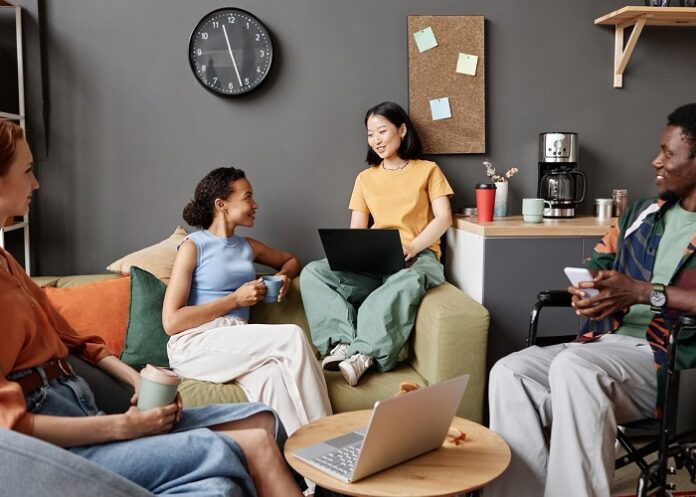A recent survey found that most young Americans under 26 (Generation Z) get their health and wellness advice from TikTok, yet at least one in 11 people have had health issues after following advice from this social media platform.
Research involving 1 000 Gen Z users by US personal trainer app Zing Coach found that 56% of them go to TikTok for health advice, while for one out of three, TikTok is the main source of health knowledge.
“Gen Z isn’t exactly the picture of perfect health – more than half of 18- to 25-year-olds are overweight – but it’s not for a lack of desire. Zing’s research shows considerable interest in pursuing health and well-being among the younger demographic,” Walter Gjergja, chief wellness officer at Zing Coach, told Healthline.
“They’re just not as willing or able to pay for a personal trainer or work with a qualified doctor. Instead, they turn to TikTok, Google and YouTube for advice because it’s fast and free.”
By doing so, he said, they expose themselves to misinformation and body confidence issues.
Aaron Zimmerman, optometrist and associate professor of clinical optometry at The Ohio State University, recently treated a patient who embraced a TikTok video that endorsed health benefits of staring at the sun.
“This individual viewed the sun for an extended period of time until it became unbearable, and she suffered permanent damage to her retinas,” he said.
“I suspect that numerous practitioners across various disciplines are seeing patients who have experienced harm from questionable content on various forms of media.”
The Zing Coach survey found that one out of three people admitted they did not double-check wellness advice they got from TikTok, while one in 10 said a high number of likes or followers was enough to make the influencer trustworthy, regardless of their professional background.
“When we see an account with millions of followers and videos with an endless stream of positive comments from other users, our first thought is that the information shared must be true. However, likes and engagement are by no means an indication of an influencer’s trustworthiness,” said Gjergja.
Ultimately, for many influencers, what they push on social media is a means to a livelihood, and some spread misinformation if it pays well enough, he added.
Additionally, the sexier and more compelling a video is, the more it was likely to spread.
“Conspiracy theories get millions of views because people think they have a secret the government doesn’t want them to know. The algorithms work in a way that if you’re following people who put out misinformation, then you’re consistently getting bad information, and if you’re getting all your information from there, then there is a big percentage of people who are not getting fact-based information.”
While three out of five people have seen health-related misinformation or harmful advice on TikTok, only one in four will call it out.
Calling out a dishonest influencer is like screaming into the void, said Gjergja.
“You could post a message about the misinformation. However, it will soon get buried under a stream of comments from loyal fans who staunchly believe everything that social media’s popular personalities say,” he said.
The effort of reporting misinformation is often not worth it to people if they don’t think the platform will remove the video, said Katrine Wallace, PhD, epidemiologist and assistant professor at the University of Illinois Chicago, who during the pandemic, decided to create educational videos on social media to ease fears.
Today, her TikTok account has more than 280 000 followers, and her Instagram has nearly 90 000. She continues to share public health information about Covid-19 and other health-related topics and debunks misinformation circulating on social media.
She points to Section 230 of the US Communications Decency Act, legislation that was passed in 1996 declaring that service providers or individual people are not to be held liable for illegal content posted online by other people.
“Platforms get paid whether it’s good or bad information,” she said.
“The way accountability can start is by changing that legislation because now we have far outgrown it. It still enables the platforms to do nothing about misinformation. Platforms have no incentive to (take action) because they make money the more things go viral, and the more they keep engagement going.”
Although 63% of people now want TikTok creators held legally accountable for the accuracy of their health advice, holding people legally accountable for producing content and videos that contain misinformation is tricky, because even though they know they are misleading or potentially harming others, they can claim their content is for entertainment reasons, added Wallace.
On the positive side, 66% of Gen Z admitted they only trust health TikToks if they come from a professional.
There are many qualified experts on TikTok and other social media who aim to offer genuine, honest, and accurate health information, Gjera said, warning that people should not just believe the words in a self-proclaimed expert’s bio.
“Whether by reading reviews from past customers, scouring their LinkedIn profiles, looking at their longevity and standing in the wellness industry, or checking a trustworthy directory for their claimed profession, people must do their research and fact-check their claims before following any advice.”
ZingCoach article – Healthy or Not? Attitudes to Wellness on TikTok (Open access)
See more from MedicalBrief archives:
Latest TikTok trend alarms health experts
TikTok challenge lands dozens of US students in hospital
Social media fuels birth control backlash
New York health advisory lists social media an environmental toxin

